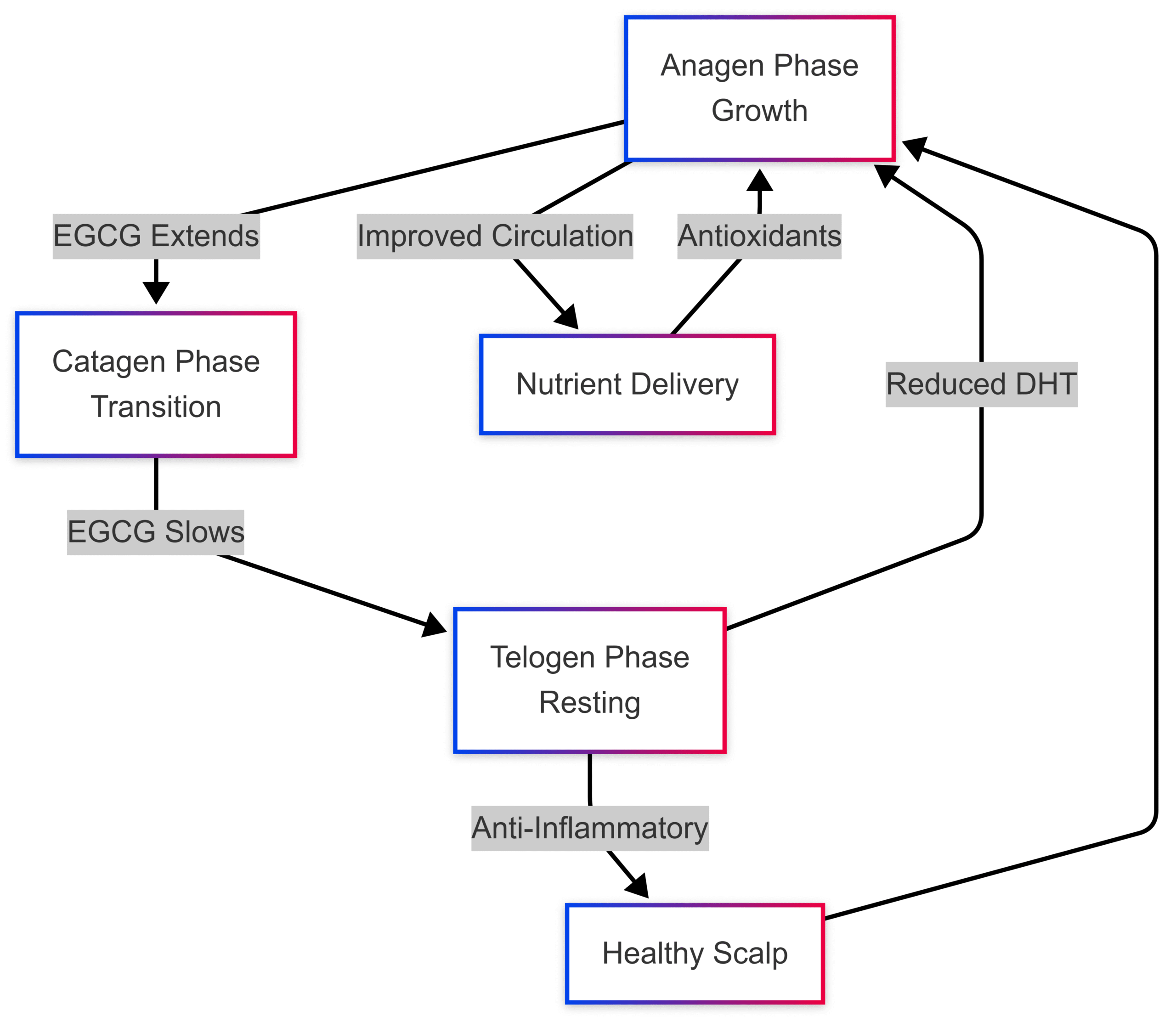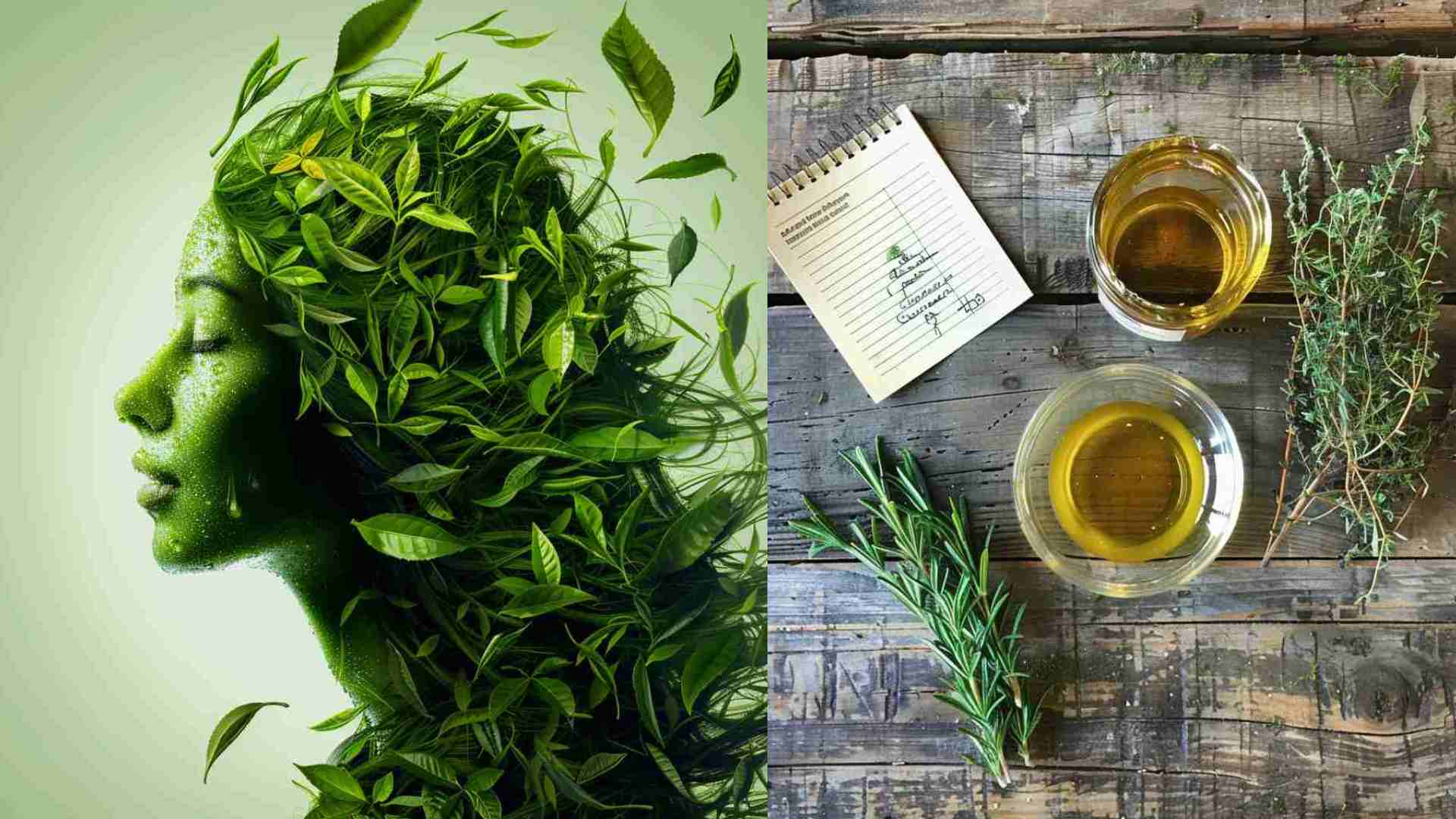Discover how green tea promotes hair growth, reduces hair loss, and enhances scalp health with expert insights and product recommendations.
Green tea, derived from the Camellia sinensis plant, has been celebrated for centuries as a health-promoting beverage. Its rich antioxidant content, particularly epigallocatechin gallate (EGCG), has made it a staple in wellness routines worldwide. Beyond its internal health benefits, green tea is gaining attention in the hair care industry for its potential to combat hair loss, stimulate growth, and improve scalp health. According to dermatologists and hair care experts, incorporating green tea into your hair care routine—whether through drinking, topical applications, or specialized products—can offer significant benefits for hair vitality. This article explores the science behind green tea’s hair benefits, how to use it effectively, and the best products to consider, all while delving into its mechanisms and practical applications.
Understanding Green Tea and Its Nutrient Profile
Green tea is produced from fresh Camellia sinensis leaves that are dried and exposed to sunlight to prevent oxidation, preserving their vibrant green color and nutrient density. Unlike black or oolong tea, green tea’s minimal processing retains a high concentration of bioactive compounds, making it a powerhouse for health and hair care.
Key Nutrients in Green Tea
Green tea’s efficacy for hair health stems from its rich nutrient profile:
- Antioxidants (EGCG): Epigallocatechin gallate is a potent catechin that combats oxidative stress, protecting hair follicles from damage caused by free radicals.
- Catechins: These flavonoids possess anti-inflammatory and antifungal properties, fostering a healthy scalp environment.
- Vitamins: Green tea contains vitamins B2, B12, C, and E, which support hair strength, collagen production, and scalp circulation.
- Amino Acids: Theanine and other amino acids strengthen hair strands, enhancing elasticity and reducing breakage.
- Minerals: Zinc and selenium regulate sebum production and support thyroid function, both critical for hair growth.
- Polyphenols: These antioxidants protect hair cells and promote follicle health.
These nutrients work synergistically to address multiple aspects of hair health, from stimulating growth to preventing damage.
The Science of Hair Loss and Green Tea’s Role
Hair loss affects millions globally, with causes ranging from genetics to stress, hormonal imbalances, and nutritional deficiencies. Androgenetic alopecia, or pattern baldness, is the most common form, impacting approximately 50 million men and 30 million women in the United States alone. This condition is driven by dihydrotestosterone (DHT), a hormone derived from testosterone that shortens the hair growth (anagen) phase and prolongs the resting (telogen) phase, leading to thinning and eventual hair loss.
How Green Tea Combats Hair Loss
Green tea’s bioactive compounds target the underlying mechanisms of hair loss in several ways:
- DHT Inhibition: EGCG inhibits 5-alpha-reductase, the enzyme responsible for converting testosterone into DHT. By reducing DHT levels, green tea helps maintain healthy hair follicles and prevents miniaturization.
- Antioxidant Protection: Free radicals from environmental stressors like UV rays and pollution can damage hair follicles. Green tea’s antioxidants neutralize these molecules, reducing oxidative stress and supporting follicle health.
- Anti-Inflammatory Effects: Chronic scalp inflammation can disrupt the hair growth cycle. Catechins in green tea reduce inflammation, creating an optimal environment for hair growth.
- Improved Nutrient Delivery: Green tea enhances blood flow to the scalp, ensuring hair follicles receive essential oxygen and nutrients. A study involving 15 participants found that green tea extract supplements increased scalp blood flow by 29% after 12 weeks.
- Hair Follicle Stimulation: EGCG stimulates hair follicles, extending the anagen phase and promoting regrowth. A small study with three participants showed increased hair growth activity after four days of topical EGCG application.
Scientific Evidence
- A pilot study funded by a supplement company found that 80% of participants with androgenetic alopecia experienced significant hair regrowth after 24 weeks of using a supplement containing green tea extract, though other ingredients were present, making it hard to isolate green tea’s impact.
- In a mouse study, topical EGCG-rich green tea reduced hair loss by prolonging the anagen phase and slowing the telogen phase.
- Another study in mice showed that 33% of those treated with green tea extract experienced hair regrowth after six months, compared to none in the control group.
While these studies are promising, dermatologists note that more rigorous, double-blinded, placebo-controlled trials are needed to confirm green tea’s efficacy, especially for non-hormonal hair loss.
Benefits of Green Tea for Hair Health
Green tea offers a multifaceted approach to hair care, addressing growth, strength, and scalp health. Here’s a detailed look at its benefits:
1. Promotes Hair Growth
Green tea’s EGCG and caffeine stimulate hair follicles, encouraging new hair growth. By extending the anagen phase, green tea helps hair grow longer and denser. The improved scalp circulation from caffeine and vitamins ensures follicles are well-nourished, supporting robust growth.
2. Reduces Hair Loss
By inhibiting DHT and reducing oxidative stress, green tea prevents follicle miniaturization and damage. Its anti-inflammatory properties also soothe the scalp, minimizing conditions like dandruff that can exacerbate hair loss.
3. Strengthens Hair
Amino acids like theanine and vitamins B and E fortify hair strands, reducing breakage and split ends. Green tea’s ability to smooth the hair cuticle enhances elasticity, making hair more resilient to mechanical stress from brushing or styling.
4. Enhances Shine and Softness
Green tea’s moisturizing properties, driven by polyphenols and vitamin E, lock in hydration, preventing dryness and frizz. A smooth cuticle reflects light, giving hair a glossy, vibrant appearance. Compared to heavier conditioners like shea butter or coconut oil, green tea provides lightweight hydration suitable for all hair types.
5. Protects Against Environmental Damage
Green tea’s antioxidants shield hair from UV radiation and pollution, preventing brittleness and color fading. Its thermal protective properties also minimize damage from heat styling tools.
6. Improves Scalp Health
The antifungal and anti-inflammatory properties of catechins reduce scalp irritation, dandruff, and seborrheic dermatitis. Zinc regulates sebum production, preventing excessive oiliness or dryness that can hinder hair growth.
How to Use Green Tea for Hair Care
Green tea can be incorporated into your hair care routine in various forms, from DIY rinses to commercial products. Here’s how to use it effectively:
1. Green Tea Rinse
- Method: Steep 1–2 green tea bags in boiling water for 5 minutes. Let the liquid cool completely, then apply it to your hair and scalp after shampooing. Massage gently and rinse with cool water.
- Frequency: Use bi-weekly for best results, as demonstrated by a user on a natural hair community who reported reduced shedding after bi-weekly green tea rinses.
- Benefits: Directly delivers antioxidants to the scalp, stimulating follicles and improving scalp health.
2. Shampoos and Conditioners
- Application: Choose products containing green tea extract, such as MDhair Regrowth Shampoo or Keeps Thickening Conditioner. Apply shampoo to the scalp, massaging gently, and conditioner to the mid-lengths and ends, leaving it on for 3–10 minutes before rinsing.
- Tips: Focus on the scalp for shampoos to target follicles and avoid over-washing to preserve natural oils.
3. Supplements
- Dosage: Take one capsule daily with food, such as MDhair Regrowth Supplements, which combine green tea extract with DHT blockers like saw palmetto and nutrients like biotin.
- Caution: Avoid exceeding 338 mg of EGCG daily from supplements to prevent liver toxicity. Consult a healthcare provider before starting.
4. Drinking Green Tea
- Recommendation: Consume 1–2 cups (240–480 ml) daily to boost internal antioxidant levels, which may indirectly support hair health.
- Safety: Most people can safely drink up to 3–4 cups daily, but excessive intake may cause stomach upset.
Visualizing the Hair Growth Cycle with Green Tea
To illustrate how green tea influences the hair growth cycle, consider the following chart:

This chart shows how green tea’s EGCG extends the anagen phase, slows the telogen phase, reduces DHT, improves nutrient delivery, and maintains a healthy scalp, all contributing to sustained hair growth.
Best Green Tea Hair Care Products
Several products harness green tea’s benefits for hair health. Below is a table comparing top options, including specifications and approximate prices (based on general market trends, as specific pricing may vary):
| Product | Type | Key Ingredients | Benefits | Price (USD) |
|---|---|---|---|---|
| MDhair Regrowth Shampoo | Shampoo | Green tea extract, biotin, saw palmetto, argan oil | Stimulates follicles, reduces DHT | ~$25–$30 (8 oz) |
| MDhair Restore Shampoo | Shampoo | Green tea extract, Fo-Ti root, black cumin oil | Improves scalp health, strengthens hair | ~$25–$30 (8 oz) |
| Keeps Thickening Conditioner | Conditioner | Green tea extract, caffeine, biotin | Enhances thickness, adds shine | ~$20–$25 (8 oz) |
| MDhair Regrowth Supplements | Supplement | Green tea extract, saw palmetto, ashwagandha | Blocks DHT, supports hair regrowth | ~$40–$50 (30 capsules) |
| Seek Bamboo Green Tea Conditioner Bar | Conditioner Bar | Green tea extract, vitamin E, amino acids | Hydrates, strengthens, eco-friendly | ~$15–$20 (2.5 oz) |
Product Spotlight
- MDhair Regrowth Shampoo: Formulated with vegan proteins and plant complexes, this shampoo targets hair loss with DHT blockers and scalp-soothing ingredients. It’s sulfate-free, paraben-free, and suitable for all hair types.
- Seek Bamboo Green Tea Conditioner Bar: This eco-friendly bar combines green tea with moisturizing agents to enhance shine and strength without synthetic additives. Ideal for sustainable hair care.
- MDhair Regrowth Supplements: These capsules combine green tea extract with essential nutrients and DHT blockers, offering a holistic approach to hair regrowth.
Precautions and Considerations
While green tea is generally safe, there are important considerations:
- Toxicity Risks: High doses of EGCG in supplements (above 338 mg daily) may cause liver toxicity or stomach upset. Stick to recommended dosages and consult a healthcare provider.
- Allergies: Those with known allergies to green tea should avoid topical or oral use. Individuals with sensitive scalps should perform a patch test or consult a dermatologist.
- Application Tips: Apply shampoos and conditioners directly to the scalp to target follicles. Avoid applying conditioners to the hair shaft alone, as it doesn’t influence growth.
- Limitations: Green tea is not a cure for hair loss. For severe cases, consult a hair restoration specialist for treatments like PRP therapy or medications like finasteride and minoxidil.
Expert Insights
Dermatologist Justine Park, MD, emphasizes that while green tea shows promise, more independent research is needed. “Most studies are small or industry-funded, so we need larger, controlled trials to recommend it universally,” she says. Hairstylist and scalp expert Mayara Macedo adds, “Green tea’s anti-inflammatory and antioxidant properties make it a great addition for scalp health, especially for those with thinning hair or irritation.”
Conclusion
Green tea is a versatile and natural solution for promoting hair growth, reducing hair loss, and enhancing scalp health. Its rich antioxidant content, particularly EGCG, targets DHT, protects follicles, and improves nutrient delivery, making it a valuable addition to any hair care routine. Whether through drinking 1–2 cups daily, using a homemade rinse, or incorporating products like MDhair Regrowth Shampoo or Seek Bamboo’s Green Tea Conditioner Bar, green tea offers accessible and effective benefits. For optimal results, combine green tea with a balanced diet, gentle hair care practices, and professional guidance for persistent hair loss. Embrace the power of green tea to transform your hair into healthier, stronger, and more radiant strands.
Please share this Green tea – for hair growth – according to dermatologists with your friends and do a comment below about your feedback.
We will meet you on next article.
Until you can read, Horsetail Extract Natural Treatment for Hair Loss Female
